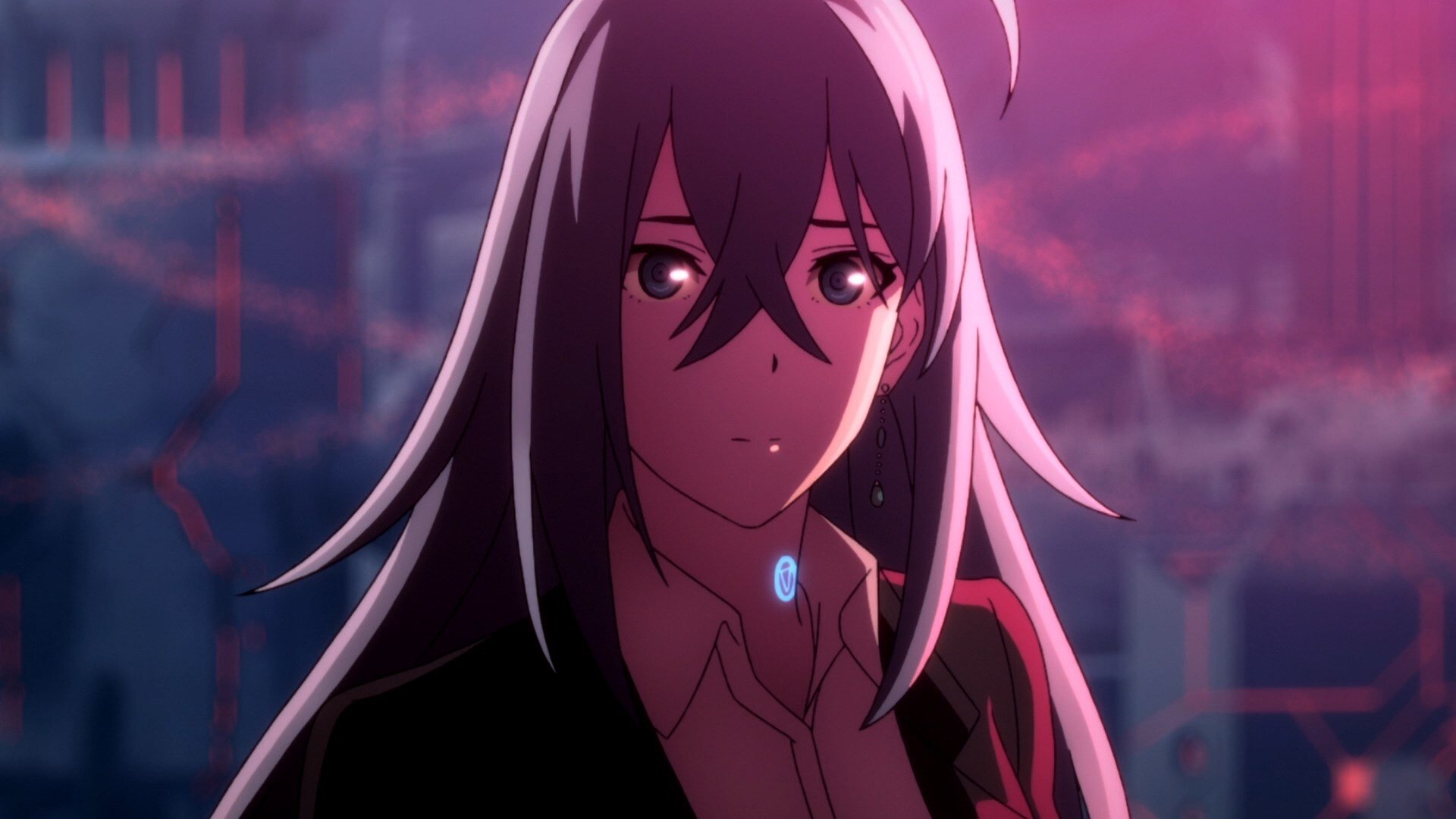I hate to admit that I (along with many others I’m sure) misjudged Vivy this season. What I assumed would be another idol anime with a futuristic twist turned out to be one of the best-looking, emotion-fueled experiences this season.
Vivy: Fluorite Eye’s Song tells the tale of a humble Idol android named Diva whose sole purpose is to make people happy with her music. Vivy is the first of the androids called “the sisters” who were made to mimic human emotions, each of who have their own function and reason for existing.

The Android That Sings
The anime’s first scene gives us a brief but bloody glimpse into this world’s distant future where androids have revolted against humans and have begun killing their creators indiscriminately. Luckily, a quick-thinking scientist is able to make it just in time before his death to send an AI to the past in hopes of preventing this disturbing future. Once the scene ends, the first episode then introduces us to Diva, the up-and-coming Idol who one day, dreams of singing on the main stage. Shortly after however, her life changes significantly when she meets Matsumoto, the aforementioned foul-mouthed AI who visits Vivy with a critical mission, one that will take a hundred years to complete, and one that only her as the first of the sisters can help with.
Unsurprisingly, Vivy is reluctant to believe the words of this strange and rude AI. However, after a lot of convincing from Matsumoto, she (albeit still reluctantly) agrees to carry out the duties she’s been forced upon for humanity’s sake, if nothing else. These two quickly form an unlikely partnership, but each with polar opposite personalities. Due to the way she’s programmed, Vivy is more caring and sympathetic, whereas Matsumoto is more cold and calculating.

The Android That Fights
Another aspect of the anime is how it includes multiple events in two to three-episode arcs. The first two episode sees our heroine on a quest to rescue a politician named Aikawa, an assemblyman that’ll contribute significantly to the war between humans and androids from an assassination attempt by an anti-android terrorist organization known as Toak. The next mission then sees her aboard a highly advanced and luxurious spaceship run solely by androids called Sunrise. If left alone, Sunrise will inevitably crash, killing hundreds on-board which will then lead to further unease between humans and androids. For the third mission, Vivy is tasked with infiltrating a self-producing island run by androids to prevent them from becoming “too advanced.”
An interesting fact about these missions is that they do not follow each other linearly. As this is a hundred-year task, each mission is spread several years apart, be it five years, fifteen years, or more. Because of this, we see Vivy grow almost at a jarring rate, both personally and as an android. It’s also worth noting that each of these missions affects her significantly, as she always comes out of them slightly different than she initially was. We see her go from the reluctant and conflicted hero Diva to Vivy; an android tasked with destroying other androids for the good of humanity.
When she isn’t kicking butt and saving lives as Vivy, she still performs her duties as Diva, as the anime makes it clear that her ultimate goal is to make others happy with her singing, both of which she does well, as we see her progressively grow her audience getting closer to her dream of singing on the main stage while doing so. However, I couldn’t help but ask myself why singing was chosen to be her primary function as many other professions would allow her accomplish her goal of helping people just as well, if not better, as seen with the other sisters in the anime. Perhaps because singing evokes more emotion in humans? Or perhaps because as the first sister, her task was made to be as simple as possible.

Storytelling & World-Building
A major property of the anime’s storytelling is the butterfly effect seen in each of the episodes. As this is a time travel-focused anime, each of Vivy’s actions causes a significant impact on the world. Most of her actions help save the lives of countless, yet others notably also hinder the lives of others. Ultimately, she’ll have to live with her actions because, in the end, it’s objectively for the greater good.
Another aspect of the anime’s storytelling is how similar it is to another popular android-themed piece of media, Detroit: Become Human. While Vivy objectively has better writing the similarities exist regardless. Like Detroit, each android in the anime is built for a specific task. The androids in both mediums share similar anatomy, function similarly, and both are incredibly advanced. And much like in Detroit, the androids in the anime are made capable of emotion and sympathy. This inevitably brings up the question on whether androids deserve the same rights as we do, which itself is a question that usually causes a war between each party.
Due to this similarity, I have a similar standpoint with Vivy: Androids should not be made capable of emotion. Just a set of tasks designed for them and Asimov’s laws. Judging by what I’ve learnt both theoretically and in media, their ability to emote seems to be a major cause of conflict. But it seems with humanity’s never-ending quest for advancement this may never change. However, this is just my two cents on the subjects. I can go on forever about the perks and dangers of android development and advancement, but that’s a different topic for a different article. All in all, I’m glad the writers Eiji Umehara and Tappei Nagatsuki (who’s also the author of ReZero) did a better job of executing these themes compared to David Cage.

Conclusion
To sum things up, I can only describe Vivy: Fluorite Eye’s Song as both grim and beautiful. The anime has one of the best animation and character designs of this season, and its direction is nothing short of astounding with stellar production value. Its story aims to evoke as much emotion as possible from its audience, and while I am a bit emotionally disconnected, there’s no doubt it succeeds at this judging by its current reception. If you’re a fan of Sci-fi and feels, then you should be watching Vivy this season.
Vivy: Fluorite Eye’s Song is currently streaming on Funimation
Have you seen Vivy: Fluorite Eye’s Song? What are your thoughts on android revolution? Let us know your thoughts in the comments section below.
























































